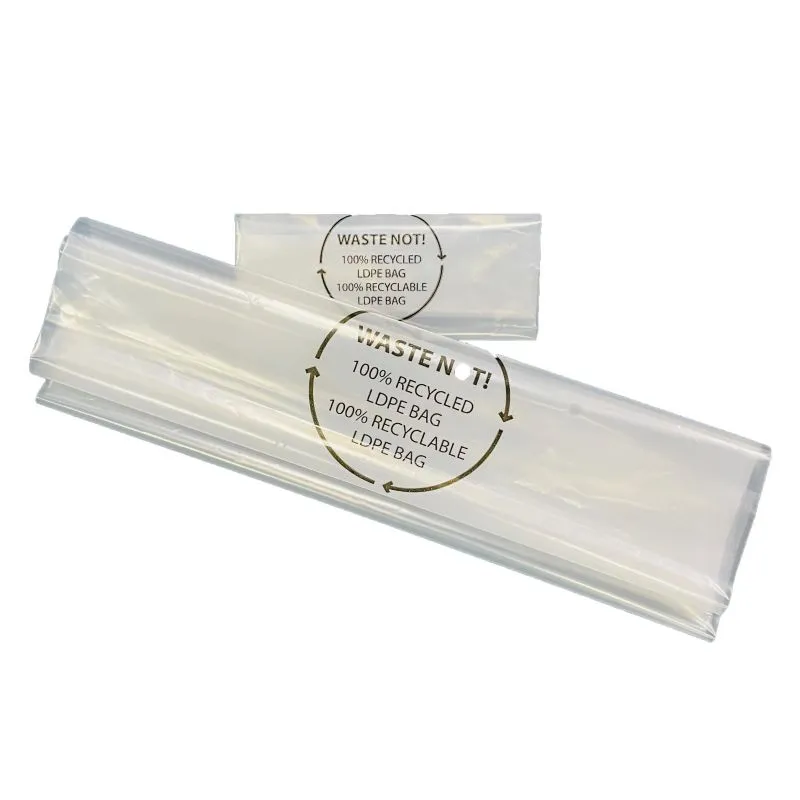Recycled Polybags: What They Are and Their Benefits
2024-11-27
Recycled polybags (polyethylene bags) are plastic bags made from post-consumer or post-industrial plastic waste, which is processed and reused to create new products. As concerns about environmental sustainability and plastic waste continue to grow, recycled polybags are becoming a more common choice for packaging and product storage, offering a greener alternative to virgin plastic bags.
In this blog, we’ll explore what recycled polybags are, how they’re made, their benefits, and their potential applications across industries.
What Are Recycled Polybags?
Polyethylene (PE) is one of the most common plastics used for producing bags, including grocery bags, product packaging, and more. When these plastic bags are used, they often end up in landfills or as litter. However, rather than being discarded, polyethylene bags can be recycled and repurposed into new polybags.
Recycled polybags are made from recycled plastic, typically derived from:
1. Post-consumer waste: These are plastic bags or products that have already been used by consumers, collected, and processed for reuse.
2. Post-industrial waste: These are plastic materials left over from the manufacturing process that are recycled back into usable products.
The recycling process involves cleaning the plastic, melting it down, and reshaping it into new products like polybags, films, or sheets.

How Are Recycled Polybags Made?
The production of recycled polybags follows these steps:
1. Collection of Waste: Used plastic bags, films, or other polyethylene-based products are collected from various sources like retail locations, collection bins, or recycling centers.
2. Sorting and Cleaning: The collected plastic is sorted to remove any non-plastic contaminants (like metal, paper, or food waste) and then cleaned thoroughly to remove dirt or oils.
3. Shredding and Melting: The clean plastic is shredded into small pieces, which are then melted down to form a uniform material. In some cases, additional additives are added to enhance the strength or flexibility of the material.
4. Extrusion and Forming: The melted plastic is extruded through a machine to form new sheets, bags, or films, which are then cut into the desired shapes or sizes.
5. Finishing: After shaping, the recycled polybags undergo finishing processes like printing or perforating, and are then packaged for distribution.
Benefits of Using Recycled Polybags
Recycled polybags offer several environmental, economic, and practical benefits:
1. Reduces Plastic Waste
The most significant benefit of using recycled polybags is the reduction in plastic waste. By reusing plastic that would otherwise end up in landfills or the environment, recycling helps mitigate the harmful impact of single-use plastics on ecosystems.
2. Lowers Carbon Footprint
Manufacturing products from recycled materials requires less energy compared to creating new plastic from raw petrochemical sources. The recycling process uses fewer resources, leading to a lower carbon footprint, which contributes to mitigating climate change.
3. Conserves Resources
By using recycled polyethylene, less virgin plastic is required, conserving fossil fuels and natural resources that would otherwise be used to produce new plastic.
4. Cost-Effective
Recycled polybags can often be more cost-effective than virgin plastic bags because the materials used are less expensive to procure, and recycling processes can be more efficient than producing plastic from scratch. This makes recycled polybags a budget-friendly option for businesses and consumers.
5. Customizable and Versatile
Recycled polybags can be customized in terms of size, thickness, color, and printing. This makes them suitable for a wide range of applications, from packaging food and groceries to holding retail products and consumer goods.
6. Supports Circular Economy
Using recycled polybags helps promote a circular economy, where products are reused and repurposed instead of being disposed of after a single use. This approach reduces waste, increases resource efficiency, and encourages more sustainable production practices.
Applications of Recycled Polybags
Recycled polybags can be used in many industries, offering an environmentally friendly alternative to traditional plastic packaging.
1. Retail and Grocery Packaging
Recycled polybags are commonly used in retail for product packaging, grocery bags, and other retail packaging needs. They are durable and flexible, making them ideal for carrying goods or protecting products during transit.
2. Food Industry
The food industry is increasingly adopting recycled polyethylene bags for packaging dry food products, snacks, or bulk items. While food-grade recycled polybags must meet specific safety standards, they are becoming a viable option for reducing the environmental impact of food packaging.
3. Industrial Packaging
Recycled polybags are used to package industrial products such as hardware, automotive parts, and textiles. These bags are sturdy, customizable, and can be used for both storage and transportation.
4. Apparel and Textiles
Clothing and textile industries often use recycled polybags for packaging garments. These bags are used to protect clothes during shipping, and many brands are moving toward more sustainable alternatives, including recycled polybags.
5. E-commerce Shipping
E-commerce companies are increasingly turning to recycled polybags for shipping items such as clothing, books, or small electronics. These bags are lightweight, cost-effective, and reduce the environmental footprint of online retail.
Challenges and Considerations
While recycled polybags offer several environmental benefits, there are some challenges and considerations to keep in mind:
1. Contamination: Recycled plastic can be contaminated by food waste, dirt, or other materials, making it difficult to recycle into high-quality bags.
2. Quality Control: Recycled polybags may not always match the quality of virgin plastic in terms of strength, clarity, or consistency. However, advancements in recycling technology are addressing these challenges.
3. Limited Recycling Infrastructure: The infrastructure for collecting and processing used plastic bags for recycling is still being developed in many parts of the world. This limits the availability of recycled polybags in certain markets.
Conclusion
Recycled polybags are an eco-friendly alternative to traditional plastic bags, helping reduce waste, conserve resources, and lower the carbon footprint of plastic production. As sustainability becomes more important to consumers and businesses alike, the use of recycled polybags is likely to grow. While there are some challenges in terms of quality and recycling infrastructure, ongoing advancements in technology are making it easier to create high-quality recycled packaging that supports a more sustainable future.


